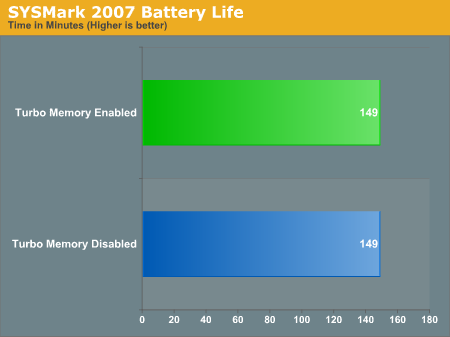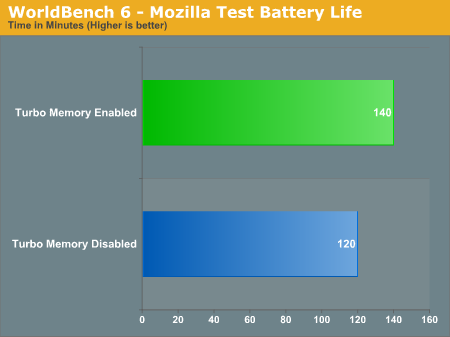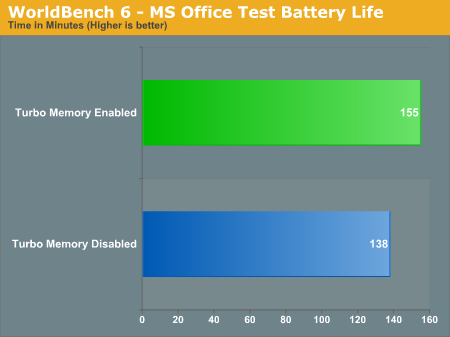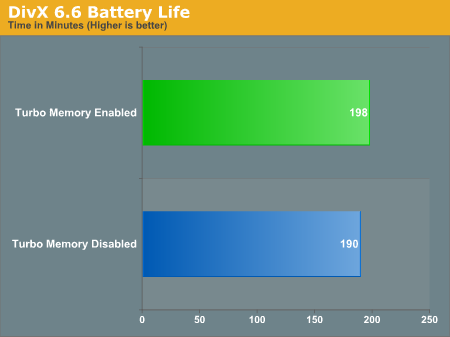Investigating Intel's Turbo Memory: Does it really work?
by Anand Lal Shimpi on June 19, 2007 3:39 PM EST- Posted in
- Laptops
A Measurable Increase in Battery Life?
With a better understanding of how Turbo Memory is supposed to work, we went out and tried to make it work. We used the same test platform from our Santa Rosa article, except with only 1GB of memory instead of 2GB.
Our first test involved a loop of SYSMark 2007 running while the system was on battery power. We used a stopwatch to measure battery life between the start of the test and when the system eventually shut down at 0% battery power remaining.

Much to our disappointment, there was absolutely no increase in battery life with Turbo Memory enabled. Even with the drive set to spin down after 1 minute of inactivity, Turbo Memory could not even buy us an extra minute of time on the battery.
We suspected that SYSMark had a bit too much going on in the background for Turbo Memory to have any impact, so we turned to simpler tests.
PC WorldBench 6 measures performance in individual applications running independently of one another; a lack of multitasking means that there's a greater chance of finding a scenario where data can be properly prefetched into the ReadyDrive cache. The only issue with WorldBench is that each test has a reboot before and after it runs, which makes the benchmark less real world since you don't normally reboot your notebook every 6 minutes; that being said, it's still worth a look.
The first WorldBench test is the Mozilla benchmark; the user basically browses the web for around 4.5 minutes and the test is run as fast as possible on the system.

Here we see a dramatic increase in battery life, a total of 20 minutes, with Turbo Memory enabled. The 16% increase in battery life is most likely due to the small dataset that we're working with here since all the test is doing is loading webpages over and over again.
We looked for another common notebook usage model with WorldBench and ran its Microsoft Office benchmark:

Once again we were met with impressive results; Turbo Memory increased battery life just over 12%, or 17 minutes.
For our final battery life test we wanted to see the impact of Turbo Memory on watching a DivX movie off of the hard drive. We loaded up a DivX rip of Casino (we've been on a mob film kick around here lately) and looped it until the battery ran down.

Our DivX playback test only resulted in a 4% increase in battery life, translating into an extra 8 minutes of movie playback. It's not huge, but when on battery power we'll take just about any increase we can get.
What's most interesting here is the wide range of improvements we've seen from Turbo Memory. From absolutely no gain in battery life under SYSMark, to more than a 16% increase under WorldBench. We expect the real world impact to be somewhere in between, and unfortunately it looks like the gains will be much less the more multitasking you do on your system.
That being said, when you're trying to squeeze out every last minute of battery life from your notebook you're usually not multitasking heavily, meaning there's a chance for Turbo Memory to make a difference.










31 Comments
View All Comments
tuteja1986 - Wednesday, June 20, 2007 - link
Gigabyte i-ram now that was revoltionary in speed wise :) . I have it and i love it but it ain't cheap :( $120 for the i-ram and $200 for 4x 4GB DDR 1 PC3200.